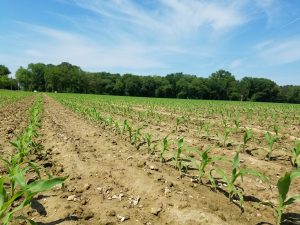Micronutrient deficiencies are commonly exhibited in agronomic crops grown on Delaware’s sandy, low organic matter soils. In 2018, University of Delaware researchers conducted a study at the Carvel Research and Education Center (Georgetown, DE) to examine corn response to manganese (Mn), zinc (Zn), and boron (B) in starter fertilizer. Two rates of Mn (0.25 and 0.5 lb/ac), Zn (0.5 and 1.0 lb/ac), and B (0.15 and 0.30 lb/ac) were applied as a liquid starter with the planter.
The goal of this project was to increase yields with additional starter applications of Mn, Zn, or B, which did not occur. However, based on the soil test UD recommendations, no additional micronutrients were called for (Shober et al., 2019). Fields deficient in Mn, Zn, or B (based on UD recommendations) would still benefit from their addition as a starter band or foliar application.
Although starter applications of B did not produce a yield effect, tissue concentrations of B increased with yield. Predicting B availability is difficult, as it is more prone to leaching than other micronutrients. With lower tissue B concentrations related to stand counts, there is potential evidence that B leached below the root zone in saturated soils. It is possible that B would benefit from split applications, similar to N management.
The application of B increased Mn content in ear leaf tissue, but not yields. Across all treatments there was a positive relationship between B and Mn uptake. The relationship between these two nutrients in should be investigated further..
Read the full report here: https://www.researchgate.net/publication/335172556_Mn_Zn_and_B_Starter_for_Corn_Production_2018_Season

